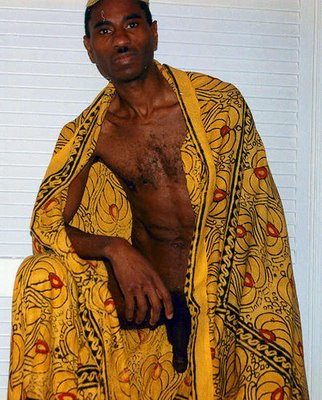 Along the northern border between Botswana and Namibia, in a region of Africa that is raging with AIDS, a small tribe of some 3,000 souls is living virtually free of HIV infection.
Along the northern border between Botswana and Namibia, in a region of Africa that is raging with AIDS, a small tribe of some 3,000 souls is living virtually free of HIV infection.But the secret of the Ju/'hoansi (pronounced ZHUN-twasi) people is not based on a mysterious immunity, modern medicine, simple isolation or missionary strictures against sex.
It stems, rather, from an idea derived from the ancient hunter-gatherer lifestyle of their recent past. It's the concept that men and women are equal, says University of Toronto anthropologist Richard Lee, who has studied the tribe since 1963.
Lee's study on the role gender equality can play in stemming the tide of African AIDS is one of about 4,500 pieces of research that will be presented at the International AIDS Conference in Toronto that starts tomorrow.
Culled from more than 14,000 international submissions, the chosen research represents one of the most comprehensive collections of knowledge about the disease ever presented.
And while people familiar with the selected submissions say no "magic bullet" cure or earth-shaking scientific advance is likely to emerge during the five-day gathering, they agree that the biannual conference still represents a crucial armament in the global fight against AIDS.
Lee's research, to be presented Monday, concludes that the relatively equal rights shared by men and women in Ju/'hoansi society has allowed them to largely escape the scourge of AIDS that is ravaging much of southern Africa.
A growing and well-accepted body a research over recent years has suggested that women's subservience in many African societies has played a crucial role in the spread of the disease.
Simply put, many African women are given no choice about their sexual partners, can't reject philandering husbands and have no power to insist that condoms be used, says pioneering Toronto AIDS doctor Philip Berger, who worked with African AIDS patients for seven months last year.
Lee says the high status of women in the Ju/'hoansi tribe gives them significant autonomy in choosing their sexual and marriage partners.
"In the other societies around the region, the young men will say, `Oh no, a girl has to obey me if I want to have sex with her, and if I don't want to use a condom, that's it,'" says Lee.
"With the Ju/'hoansi, their high status in the community gives women plenty of leverage in sexual negotiations."
Indeed, Lee says, acceptance of a man's sexual advances is usually a prelude to marriage in the tribe. And Ju/'hoansi men would typically have fewer female partners than males in most western societies, he says.
"The traditional high status of women has worked in their favour in keeping the rates of HIV very low."
The tribe, which straddles the Namibia-Botswana border, live in a remote area removed from truck routes that have served as conduits for AIDS in Africa.
Their isolation has no doubt offered a buffer against the disease for the community, where the incidence of HIV infection is likely less than 4 per cent, Lee says. Infection rates in Namibia as a whole are 20 per cent or more.

But Lee says other equally isolated tribes can exhibit high incidence of AIDS. What sets the "click language" speaking Ju/'hoansi apart is the hunter-gatherer culture they only partially abandoned in recent decades, he says.
"Before the age of AIDS the Ju/'hoansi were famous in anthropology for being among the last hunting and gathering people in the world," says Lee who has worked extensively on anti-AIDS initiatives in the region.
And unlike most African cultures, which have long been based on farming or urban existence, hunter-gatherers typically granted women significant respect and status, he says. Even today, Lee says, the Ju/'hoansi practise some hunter-gathering survival strategies, but mix in farming and herding.
Lee's study joins dozens of other convention papers from researchers at the University of Toronto, which has taken an unofficial role of "research host" at the meeting. Indeed, U of T professors were instrumental in the collection and vetting of the research papers being presented at the conference.
As Canadian Scientific co-chair for AIDS 2006, professor Liviana Calzavara helped orchestrate the work of more than 4,500 international reviewers who sifted through and selected from the record number of research papers submitted to the conference.
"Each of them (the reviewers) were sent, based on their expertise, anywhere from 30 to 60 (research) abstracts to review," says Calzavara, deputy director of U of T's HIV Social, Behavioural and Epidemiological Studies Unit. "And the abstracts were actually blinded, they did not have the names of the authors or where they were coming from to avoid that kind of a bias."
The abstracts, a short synopsis of the research being submitted, were scored based on scientific rigour, originality and relevance. The top-scoring papers were generally allotted oral presentation slots at the conference's scientific sessions. Others will be displayed as "poster presentations" — literally a poster detailing the work accompanied by the author around the Metro Toronto Convention Centre.
The conference is divided into five different disciplines. They include basic science, clinical science, epidemiology and prevention science, social, behavioural and economic science and policy.
About 900 international "scholarships" were awarded by the conference to allow researchers and representatives from poorer nations to attend the conference. Another 1,000 Canadian scholarships were awarded to young researchers across this country.
Organizers cut down slightly on the number of papers being presented to facilitate more time for open discussion.
Calzavara said, however, that there was likely to be little research of a truly groundbreaking nature presented at the meeting.
"This may not be a conference where we are going to have some outstanding thing that's going to turn the discipline on its head or solve the problem," she said.
"We're not expecting a magic bullet, but I think the conference will make some significant contributions."
from The Toronto Star / Joseph Hall
No comments:
Post a Comment